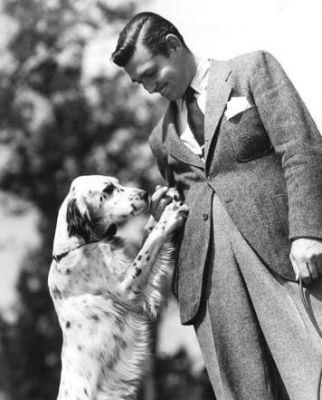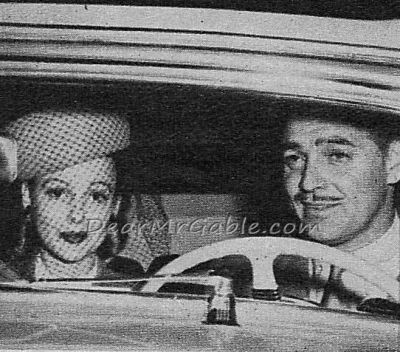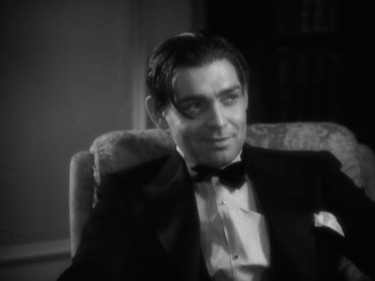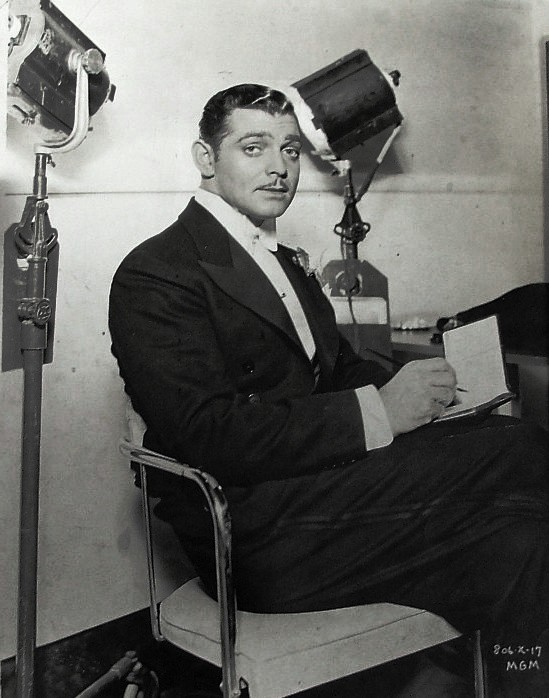{New Article} 1938: Gentle Gable
This article is the publicity team at Metro Goldwyn Mayer doing their job–depicting roughneck Gable as a simple, nice soul. And while it is sugary sweet, there are probably some seeds of truth here and there.
Nor would anyone expect him, to take time out, away from his own problems, to sit down for hours at a time, every few months, and talk about a little shaver whom he has never seen, a little fellow named Bobby. Yet his understanding of children and their interests is so real to him that it stretches farther than the mere lessons in whittling that he can give to extra children on the set. Gable first became interested in Bobby when he met Bobby’s mother in one of the Metro offices several years ago, and discovered that she was both mother and father to the boy, because Bobby no longer had a father. That interested Gable from the beginning; at once he began fretting and worrying, cautioning the mother not to spoil the boy in an effort to make up for the father-loss.
“That’s the temptation with you women anyway,” he said. ‘I’m going to make it my responsibility from now on that you don’t make a little sissy out of him.” The mother thought it over and a few months later she put the boy in military school. But when Gable heard that, he was more upset than before. “You didn’t get the idea, honey. I didn’t mean that. From what you’ve told me about him he’s not the type for military school, not at all. He’s too much of an individualist for that. He doesn’t like it, does he?” And the mother, also a little worried, had to admit that he didn’t like it at all; that he hated it in fact. “But what’ll I do? Take him out?” she asked.
Gable thought about it for a long time. It’s characteristic of him that his consideration of everything, even a little fellow’s problem, is carefully weighed. “No,” he said finally, “make him stick it out; that’ll be a lesson in itself. Anything once started must be finished. But when this year’s over, you just push him out. Let him fend for himself, then. It’s time. He’s almost nine, isn’t he?”
At nine now, Bobby is in public school. He sits with a Mexican on one side of him and a midget on the other, and he gets in at least three fights a day, and Gable, every time he is in the office, listens to a blow-by-blow account of them, and both mother and movie star seem to gloat over the recital. “That’ll do it,” Gable nods in complete satisfaction. “That’ll make a man of him. Well, tell him I said ‘hello!’”
That’s a very simple story. There are no surprising twists to it. Gable did not send the boy electric trains, a three-gear bicycle, or anything of the sort; but what he has sent to him, via the mother, is far more important than any of these.
I have never heard that story before, but if it is even half true, it doesn’t surprise me. Clark was always fond of children and it wasn’t unheard of for him to go out of his way to help one out. And I couldn’t help but feel a bit sad at Clark being very concerned about a little boy who didn’t have a father…as his son would be in that same spot decades later.
No one who was at Clark’s house that Sunday afternoon when his pet chow was run over will ever forget the misery he suffered when the dog dragged himself in from the road. Clark heard his whimpering, and found him, bleeding and torn, at the back steps. There he sat with the dog in his arms, rocking it back and forth; the shouts and laughter in the front part of the house unheeded. At first a few thoughtless souls tried to drag him inside, back to being jovial host again, telling him that he could always buy a new dog. But eventually they understood that this was something which had cut really deep into the Gable heart. They saw that his sadness was not “show,” not synthetic, that the man was really as close to tears as a strong man can be. They left him then, straggled away; there was no more spirit for gaiety; the party was over; and all that was left was a man with his dog dying in his arms. Clark held him close until the life was gone. With dogs, with calves, with colts and horses it is always the same; a man who is not too famous or too prosperous or too successful to have time and heart for sick and hurt things.
I haven’t heard this story before either but again, it wouldn’t surprise me. He did have a chow in the early 1930’s. Clark had a soft spot for animals of all kinds and always had a few dogs at a time. I know a very successful businessman who often gives talks on how he markets and meets the right people. One of his mottos is “Never trust a person who doesn’t like dogs.” I think Clark would agree.
You can read the article in its entirety in The Article Archive



